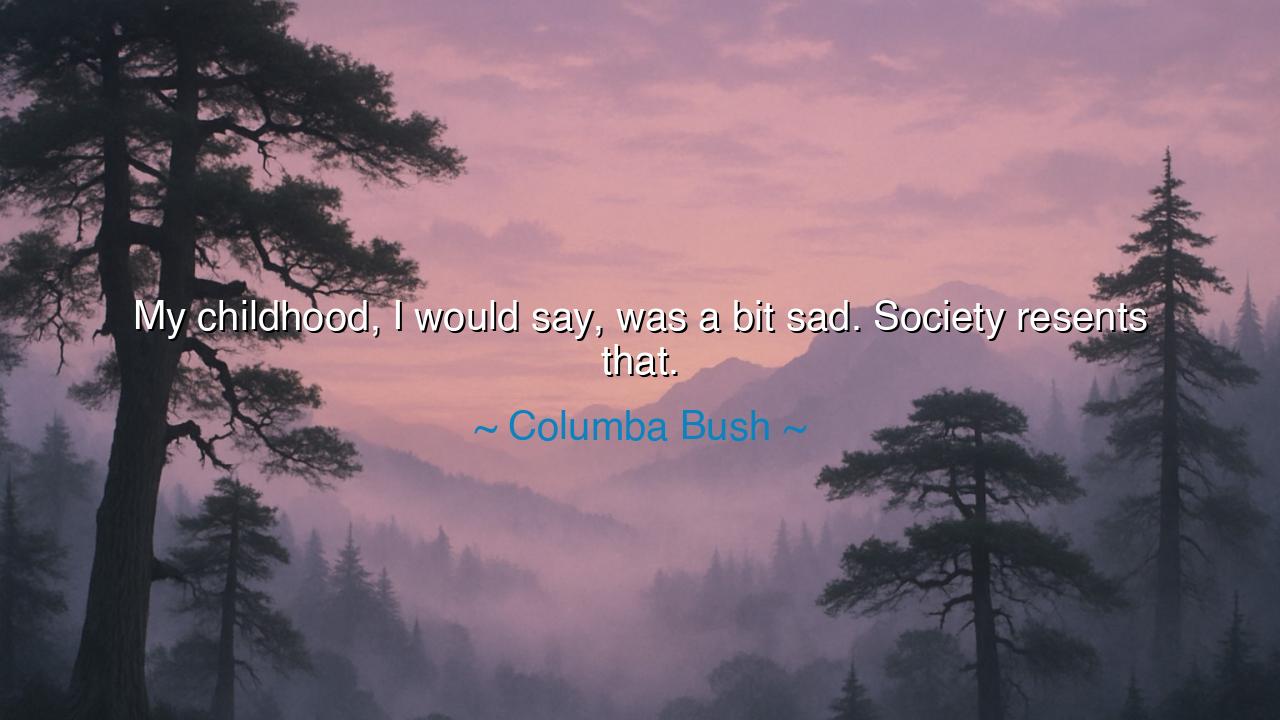
My childhood, I would say, was a bit sad. Society resents that.






In the quiet words of Columba Bush we hear the cry of many generations: “My childhood, I would say, was a bit sad. Society resents that.” This confession is more than personal—it is a mirror held up to humanity itself. For in every age, those whose early years are marked by sorrow often carry wounds that linger like shadows across the soul. Yet, paradoxically, the world looks upon such wounds with suspicion. Society resents the broken child, as though grief were a crime, as though pain were a stain. And so the one who suffered in silence must also bear the weight of judgment, long after the hour of suffering has passed.
This utterance reveals a truth older than empires: that childhood is sacred ground, and what is planted there grows into the tree of one’s life. If the soil is rich with love, the branches spread wide and bear fruit. But if the soil is barren, if the rains of kindness do not fall, the tree bends under invisible weight. Yet how strange, that the same society which failed to nurture often chooses to resent the one whose growth was twisted by neglect. Rather than compassion, they offer contempt; rather than mercy, rejection.
History gives us many such tales. Consider the life of the poet Edgar Allan Poe. His childhood was marred by abandonment, by death, by loss. His genius, though undeniable, was always shadowed by inner torment. The world consumed his work, yet it often despised the fragility of the man himself. Here we see the prophecy of Bush’s words: society delights in the fruit of suffering, yet resents the reminder of its roots. For to look upon a sad childhood is to confront collective failure, and humanity often turns its eyes away from such a mirror.
And yet, from sadness can arise profound strength. The ancients knew this. They spoke of the phoenix, which must burn to ashes before it can rise with greater glory. So too with those whose childhood is heavy with sorrow. Out of their pain can come empathy, resilience, and wisdom. But only if the world allows it, only if society meets sadness with compassion rather than resentment. For resentment chains the soul to its wounds, while compassion releases it to heal and soar.
The words of Columba Bush are not only lament—they are warning. They teach us that societies which despise vulnerability also destroy potential. When we cast aside the sorrowful, we lose poets, leaders, healers, and visionaries. For many of the greatest spirits were first broken in youth. Abraham Lincoln, haunted by melancholy since boyhood, became a man of deep humanity, leading his nation through its darkest trial. His greatness was not in spite of his sadness, but forged within it. Had his society despised his inner wounds, would his gifts have reached the world?
Thus, the lesson to be taken is clear: we must meet the sad childhood not with judgment, but with care. To the young who struggle, let us offer a hand rather than a turned back. To the adults who carry those old sorrows, let us grant respect, not suspicion. For every wounded child who is welcomed, believed in, and uplifted may yet rise to greatness. And every wounded child who is scorned is a treasure cast into the dust.
Practical action lies before each of us: look around, and seek the ones whose childhood has left them with heavy hearts. Do not resent their pain; honor it. If you are a teacher, look upon the struggling student with patience. If you are a friend, listen without judgment. If you are a parent, know that your tenderness may be the difference between despair and hope. And if you yourself carry the weight of a sad childhood, let Bush’s words remind you that your pain is not shameful. Rather, it is the soil in which strength may grow.
In the end, remember this: society may be quick to resent, but wisdom chooses to embrace. Be of the wise. Choose compassion. Choose understanding. For by lifting the wounded, you lift the whole of humanity. And as the ancients would remind us: a civilization is judged not by how it treats the mighty, but by how it tends to the fragile.






AAdministratorAdministrator
Welcome, honored guests. Please leave a comment, we will respond soon